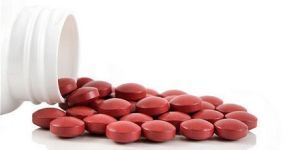Article
Additional Analysis Deems Irritable Bowel Syndrome Drug Rifaximin Safe
Author(s):
Rifaximin, an antibiotic intended to treat non-constipation-predominant irritable bowel syndrome (non-C IBS), was deemed safe in an analysis published online in the May issue of Alimentary Pharmacology & Therapeutics.

Rifaximin, an antibiotic intended to treat non-constipation-predominant irritable bowel syndrome (non-C IBS), was deemed safe in an analysis published online in the May issue of Alimentary Pharmacology & Therapeutics.
Philip Schoenfeld, MD, and colleagues were concerned about antimicrobial resistance that could occur with rifaximin, since it may require repeated courses of treatment. Although previous phase 2b and phase 3 randomized control trials (RCTs) on the drug acknowledged this risk, detailed safety and tolerability follow-up research was neither examined nor published. As a result, the researchers determined rifaximin’s safety by pulling data from those trials.
To understand the occurrence of adverse effects (AE) associated with rifaximin, the investigators conducted a post-hoc analysis of 1,940 patients in the phase 2b and 3 studies. They followed up with patients from the studies and inquired about AEs. The follow-up time was 12 weeks for patients who participated in the phase 2b study, and 10 weeks for those who enrolled in phase 3.
The researchers found the rate of AEs on rifaximin was comparable to placebo, which agreed with the results of 5 double-blind meta-analyses that also deemed rifaximin tolerable.
“The most common AEs experienced during the overall evaluation period by patients in the rifaximin group (pooled) and the placebo group, respectively, included those associated with the gastrointestinal (GI) tract or with infection, with upper respiratory tract infection and nausea reported most often in the pooled rifaximin group,” the authors wrote.
Additionally, the investigators noted participants prescribed rifaximin in the phase 3 trial had the least occurrence of infectious AEs.
“Among patients treated with rifaximin 550 mg 3 times daily, 10.9% experienced a GI-associated AE during treatment; nausea, abdominal pain, and flatulence were most frequently reported,” the authors wrote. “This group also had the lowest reported incidence of infection-associated AEs (5.1%) during treatment compared with the other dosage groups, as well as compared with the pooled rifaximin analysis.”
“Rifaximin appears to be safe and well-tolerated in the treatment of non-C IBS — with no increased risk of infections, including C. difficile infection, and no substantial differences in any AEs versus placebo,” the investigators concluded. “This profile would be a major benefit of rifaximin for treatment of IBS when used in appropriate subgroups of patients.”





